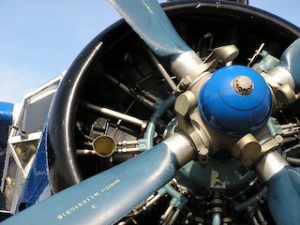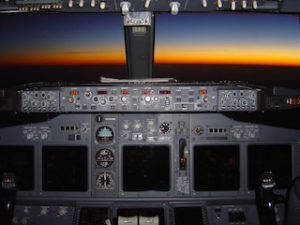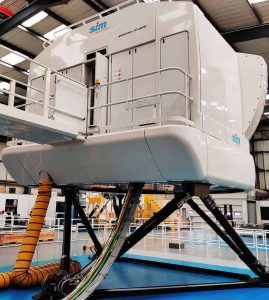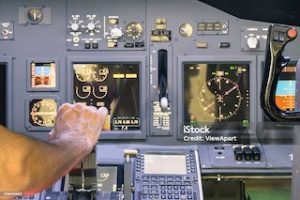Ground School in Multi-Crew Cooperation (MCC) Training for the Airline Industry
 Ground school is a critical component of Multi-Crew Cooperation (MCC) training, designed to equip pilots with the theoretical knowledge and understanding necessary for effective multi-crew operations. This phase of training focuses on the principles of multi-crew operations, human factors, and Crew Resource Management (CRM). Additionally, ground school involves discussions and case studies on real-life incidents and accidents, providing valuable lessons from past experiences. This article explores these two key aspects of ground school in MCC training, emphasising their importance in developing competent and safety-conscious pilots.
Ground school is a critical component of Multi-Crew Cooperation (MCC) training, designed to equip pilots with the theoretical knowledge and understanding necessary for effective multi-crew operations. This phase of training focuses on the principles of multi-crew operations, human factors, and Crew Resource Management (CRM). Additionally, ground school involves discussions and case studies on real-life incidents and accidents, providing valuable lessons from past experiences. This article explores these two key aspects of ground school in MCC training, emphasising their importance in developing competent and safety-conscious pilots.
Theoretical classes covering the principles of multi-crew Operations, human factors, and CRM
The theoretical component of MCC ground school is designed to provide pilots with a comprehensive understanding of the principles that underpin multi-crew operations. This knowledge is essential for ensuring that pilots can operate effectively as part of a team, manage human factors, and adhere to CRM principles.
1) Principles of multi-crew operations
- Team dynamics: The foundation of multi-crew operations lies in understanding team dynamics. Pilots learn about the roles and responsibilities of each crew member, the importance of role clarity, and the necessity of effective teamwork.
- Standard operating procedures (SOPs): SOPs are critical for ensuring consistency and safety in multi-crew operations. Pilots are trained on the importance of following SOPs and the procedures for various phases of flight, including pre-flight checks, takeoff, cruising, and landing.
- Workload management: Efficient workload management is essential in a multi-crew setting. Theoretical classes cover techniques for task prioritisation, delegation, and balancing the workload between crew members to avoid fatigue and ensure optimal performance.
2) Human factors
- Cognitive processes: Understanding how cognitive processes such as perception, attention, memory, and decision-making impact pilot performance is crucial. Pilots learn about the limitations of human cognition and strategies to mitigate potential errors.
- Stress and fatigue: Classes on human factors address the physiological and psychological effects of stress and fatigue on performance. Pilots are taught stress management techniques and the importance of rest and recovery to maintain peak performance.
- Human error: Recognising that human error is inevitable, pilots are trained to identify common error types, understand their causes, and implement strategies to minimise their occurrence and impact on safety.
3) Crew Resource Management (CRM)
- Communication skills: Effective communication is at the heart of CRM. Pilots are trained in communication protocols, active listening, and assertiveness. They learn how to communicate clearly and concisely, especially in high-pressure situations.
- Decision-making: CRM emphasises collaborative decision-making, where input from all crew members is considered. Pilots learn various decision-making models and techniques for making timely and accurate decisions.
- Leadership and followership: Pilots are trained to take on both leadership and followership roles. Leadership training focuses on providing clear instructions and making authoritative decisions, while followership training emphasizes supporting the leader and executing tasks diligently.
The theoretical classes in ground school provide pilots with a solid foundation in the principles of multi-crew operations, human factors, and CRM. This knowledge is essential for fostering a safety-conscious and efficient operational environment.
Discussions and case studies on real-life incidents and accidents to learn from past experiences
A significant part of MCC ground school involves analyzing real-life incidents and accidents through discussions and case studies. This approach allows pilots to learn from past experiences, understand the root causes of accidents, and apply these lessons to prevent future occurrences.
1) Case study methodology
- Detailed analysis: Case studies provide a detailed analysis of specific incidents and accidents, examining the sequence of events, contributing factors, and outcomes. Pilots review official investigation reports, cockpit voice recordings, and flight data to gain a comprehensive understanding of each case.
- Multidisciplinary perspective: Discussions on case studies involve a multidisciplinary perspective, considering technical, human, and organizational factors. This holistic approach helps pilots appreciate the complexity of aviation incidents and the interplay of various elements.
2) Learning from mistakes
- Human error and CRM failures: Many case studies highlight human errors and CRM failures. Pilots learn about common pitfalls such as miscommunication, poor decision-making, inadequate leadership, and failure to adhere to SOPs. By understanding these errors, pilots can develop strategies to avoid similar mistakes.
- Successful interventions: Case studies also examine instances where effective CRM and quick thinking prevented potential accidents. These positive examples reinforce the importance of CRM principles and encourage pilots to apply them consistently.
3) Enhancing situational awareness
- Recognising warning signs: Discussions on real-life incidents help pilots recognize early warning signs of potential issues. By studying cases where subtle cues were missed, pilots learn to maintain heightened situational awareness and identify anomalies before they escalate.
- Scenario-based learning: Pilots engage in scenario-based learning, where they discuss how they would handle similar situations. This interactive approach encourages critical thinking and application of theoretical knowledge to practical scenarios.
4) Improving decision-making skills
- Analysing decision points: Case studies often focus on key decision points during incidents and accidents. Pilots analyze the decisions made, their rationale, and their consequences. This helps pilots develop better decision-making skills and understand the importance of timely and well-informed choices.
- Risk assessment: Pilots learn to assess risks and evaluate the potential impact of their decisions. By understanding the trade-offs involved in different courses of action, pilots can make more balanced and safety-oriented decisions.
5) Developing a safety culture
- Promoting open communication: Discussions on real-life incidents emphasize the importance of open communication and reporting. Pilots are encouraged to share their experiences, report safety concerns, and contribute to a culture of transparency and continuous improvement.
- Learning from near misses: Case studies often include near-miss incidents where potential accidents were narrowly avoided. By studying these cases, pilots understand the value of reporting and analyzing near misses to prevent actual accidents.
6) Institutional lessons
- Organisational changes: Pilots learn about the organisational changes and safety improvements implemented after significant incidents. This highlights the importance of a proactive safety culture and continuous learning at the organisational level.
- Regulatory impact: Discussions also cover the regulatory impact of major accidents, including changes in aviation regulations and standards. Pilots understand how regulations evolve to enhance safety and the importance of compliance.
By incorporating discussions and case studies on real-life incidents and accidents, MCC ground school provides pilots with valuable insights and practical lessons that complement their theoretical training. This approach not only enhances their understanding of multi-crew operations and CRM but also fosters a deep commitment to safety and continuous improvement.
Conclusion
Ground school is a vital component of MCC training, providing pilots with the theoretical knowledge and practical insights necessary for effective multi-crew operations. Through comprehensive classes on the principles of multi-crew operations, human factors, and CRM, pilots develop a solid foundation in the essential skills and knowledge required for their roles. Additionally, discussions and case studies on real-life incidents and accidents offer invaluable lessons from past experiences, reinforcing the importance of safety, communication, teamwork, and continuous improvement.
By combining theoretical instruction with practical case studies, MCC ground school ensures that pilots are well-prepared to meet the challenges of modern aviation. This holistic approach to training not only enhances pilot competence but also contributes to a culture of safety and excellence in the airline industry.










